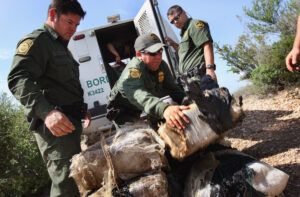The UN's International Narcotics Control Board (INCB) annual report released today pointedly criticizes Argentina, Brazil and Mexico for moving to decriminalize the possession of drugs for personal consumption, cautioning that such moves may "send the wrong message." The INCB report expresses concern over "the growing movement to decriminalize the possession of controlled drugs" and calls for this movement to be "resolutely countered" by the governments of Argentina, Brazil, Mexico and the United States.
According to the Transnational Institute (TNI) and the Washington Office on Latin America (WOLA), the criticisms leveled today clearly overstep the INCB's mandate and constitute unwarranted intrusions into these countries' sovereign decision-making. TNI and WOLA are non-governmental organizations with expertise in both the UN drug control system and Latin American drug policy developments.
In August 2009, Argentina's Supreme Court of Justice declared unconstitutional the punishment of possession of cannabis for personal use. Last year, Mexico, through legislation, decriminalized the possession of drugs for personal consumption. In 2006, Brazil moved to partial decriminalization, replacing prison sentences with treatment and educational measures.
"There are too many consumers and small-time drug offenders overcrowding Latin American jails. This is not only inhumane, it also means justice systems are diverting their scarce resources and attention away from big traffickers," said Pien Metaal, TNI Drugs and Democracy Program Researcher. "Part of the overcrowding problem stems from disproportionate prison sentences for non-violent offenders."
Experiences so far with decriminalization of possession of drugs for personal use have not led to significant increases in drug use. In 2001, Portugal decriminalized the possession of all drugs for personal use, and has since seen a decrease in heroin use and in related adverse consequences, such as the spread of HIV/AIDS.
Created in 1968, the INCB monitors implementation of the UN's 1961 and 1971 international drug control conventions, and of the precursor control system established under the 1988 convention. According to TNI and WOLA, the INCB is clearly acting beyond its mandate by criticizing countries' jurisprudence and policies regarding decriminalization.
"In the case of the Argentine Supreme Court ruling, it is arrogant interference by the INCB to question the judgment of the highest judicial authority of a sovereign State. The INCB has neither the mandate nor the expertise to challenge such a decision," said Martin Jelsma, TNI Drugs and Democracy Program Coordinator.
The INCB justifies its call to ‘resolutely counter' the decriminalization trend by ‘reminding' governments of provisions in the 1988 Convention. "But apparently it's the INCB that needs reminding, both about the limits of its own role and about what the treaties actually require," said John Walsh, WOLA Senior Associate. "Not only does the INCB lack the mandate to raise such issues, the INCB misreads the 1988 Convention itself, asserting an absolute obligation to criminalize drug possession when the Convention explicitly affords some flexibility on this matter."
Specifically, the INCB report states that the 1988 Convention requires each party to "establish as a criminal offence […] the possession, purchase or cultivation of narcotic drugs or psychotropic substances for personal consumption…" However, the INCB report neglects to mention a phrase that is crucial to interpreting the Convention. Article 3, paragraph 2 explicitly states that measures to criminalize possession for personal consumption are subject to each country's "constitutional principles and the basic concepts of its legal system." Therefore, subscribing to the 1988 Convention only obligates a country to criminalize possession for personal consumption when that does not present a conflict with a nation's constitutional and legal principles, leaving governments with a certain latitude within the Conventions to reform their laws accordingly. For more information on the Conventions and the INCB's mandate, click here.
Like last year, the INCB uses its annual report to reprimand Bolivia for the continuation of coca chewing and other traditional uses of coca. In 2008, Bolivia enshrined in its Constitution the coca leaf as a cultural heritage. "The INCB again shows itself to be out of touch with reality by demanding that Bolivia stamp out coca use, also wrongfully prohibited in the Conventions," said TNI's Pien Metaal. "The controversies around Article 3 of the 1988 Convention and the erroneous treatment of the coca leaf in the 1961 Convention are two examples of why the drug control treaty system, including the role played by the INCB, needs to be revised."
For more information on Latin America's trend toward decriminalization, click here.
Contact Kristel Mucino for further information: kmucino@wola.org; Cell: +617-584-1713




